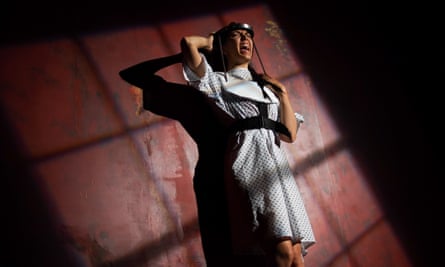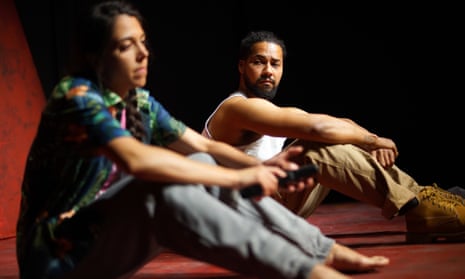Tegan McLeod’s drama about American citizenship, illegal immigration and border control around Mexico comes just as the debate is reignited by the photograph of the lifeless bodies of Óscar Alberto Martínez Ramírez and his daughter Valeria lying on the bank of the Rio Grande.
In Lunatic 19s, the focus is on deporting an undocumented Latina worker from Kentucky who has lived in America for almost 23 years. Gracie (Gabriela Garcia) is recovering from a near-fatal car crash when Alec (Devon Anderson), an immigration enforcement officer, tells her she once broke the law years ago, by returning a rental car late, and has lost all her rights. Alec’s mission is to drive the handcuffed Gracie across the border and leave her in Mexico.
A hostile prisoner/guard road trip begins and while some of the bigger debates around immigration play out, these are never directly, polemically, addressed. Instead, they are found within the psychological drama between Gracie and Alec. Gracie guesses that Alec is of Mexican heritage and says he is betraying his people. He calls himself all-American and says he had no choice but to take the job. The question of “earning” the right to citizenship lingers uncomfortably between them.

Gracie occasionally moves back in time, stepping out of her hospital bed or the prison van to tell us of her journey to the US, her abusive marriage, a miscarriage and her childhood haemophilia. The switches are well paced, never blunt, and they give the play its dreamlike quality.
Shifts in the power balance between Gracie and Alec are deftly done, as are the moments of self-exposure and tenderness between them. Their relationship carries shades of Vladimir and Estragon in Waiting for Godot, the prisoner-and-guard dynamic blurring as their journey progresses.
Even though dialogue remains naturalistic, the drama has a pared-down, expressionist quality. There are almost no props and Carla Goodman’s bare, blood-red set brilliantly invokes the blood of Gracie’s miscarriage and the physical brutality of displacement and deportation.
Under Jonathan Martin’s direction, the drama never feels static despite the emptiness of the stage. The slightly surreal or dreamy aspects work well, too: Gracie begins to transform the journey in her mind through a kind of magical thinking, turning the horror of what is happening into “signs” to the destiny that awaits her.
Both Garcia and Anderson give impassioned performances, especially Garcia, whose part is far better developed. Even if the reversal in power and a late burst of sexual attraction may not fully convince, it does not matter. This is powerful drama made all the more so by recent events in the US, though its biggest strength lies in its imagination, not its politics.

Comments (…)
Sign in or create your Guardian account to join the discussion